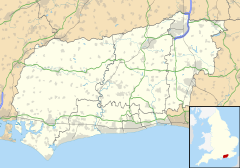Yapton
| Yapton | |
|---|---|
 | |
Location within West Sussex | |
| Area | 7.9 km2 (3.1 sq mi) |
| Population | 3,571 (Civil Parish.2011)[1] |
| • Density | 452/km2 (1,170/sq mi) |
| OS grid reference | SU979031 |
| • London | 52 miles (84 km) NNE |
| Civil parish |
|
| District | |
| Shire county | |
| Region | |
| Country | England |
| Sovereign state | United Kingdom |
| Post town | ARUNDEL |
| Postcode district | BN18 |
| Dialling code | 01243 |
| Police | Sussex |
| Fire | West Sussex |
| Ambulance | South East Coast |
| UK Parliament | |
| Website | http://www.yaptonpc.gov.uk/ |
Yapton is a village and civil parish in the Arun District of West Sussex, England. It is centred three miles (4.8 km) north east of Bognor Regis at the intersection of the B2132 and B2233 roads.
The parish of Yapton lies on the coastal plain south west of Arundel, between the South Downs and the sea. St Mary the Virgin parish church, 13th century or earlier in origin, is in the centre of the village. It houses a twelfth-century font. Nearby, Yapton Free Church was built in 1861 as a Congregational chapel but is now Evangelical in character. Yapton C of E Primary School was founded in 1864.[2]
Other settlements in the parish include Bilsham and Flansham. Bilsham Chapel is a deconsecrated former chapel of ease to St Mary the Virgin Church; it dates from the 13th–14th century but fell out of use in the mid-16th century. The building is now a house.[3]
History
The disused Portsmouth and Arundel Canal which linked nearby the River Arun to Chichester Harbour, runs through the village. This was built primarily on the financial case it would be a safe inland shipping route between London and Portsmouth avoiding the then risk of attack in the English Channel by the French. Throughout its lifetime, 1823-1855 - a time when the Wey and Arun Canal was open (having opened 7 years earlier and having closed in 1871) - the route was used for transporting agricultural goods and munitions, for instance, from Chilworth and Hanworth gunpowder works and to/from the military docks on the lower Thames in the Royal Borough of Greenwich.
Governance
An electoral ward in the same name exists. This ward stretches South East to Climping with a total population of 5,926 at the 2011 Census.[4]

Notable residents
Duncan Goodhew, the Olympic swimming maestro was brought up in Yapton. There is a residential road, Goodhew Close, named after him. Sculptor Ginger Gilmour works from a 15th-century farmhouse[5] near Yapton,[6] where she has created several studios.[5] The poet Andrew Young lived in Yapton after he retired in 1959.[7]
References
- ^ Key Statistics; Quick Statistics: Population Density United Kingdom Census 2011 Office for National Statistics Retrieved 10 May 2014
- ^ Hudson, T. P. (ed) (1997). "A History of the County of Sussex: Volume 5 Part 1 – Arundel Rape (south-western part including Arundel). Yapton". Victoria County History of Sussex. British History Online. pp. 245–261. Retrieved 7 January 2021.
{{cite web}}:|first=has generic name (help) - ^ Hudson, T. P. (ed) (1997). "A History of the County of Sussex: Volume 5 Part 1 – Arundel Rape (south-western part including Arundel). Yapton". Victoria County History of Sussex. British History Online. pp. 245–261. Retrieved 27 November 2011.
{{cite web}}:|first=has generic name (help) - ^ "Ward Population 2011". Retrieved 14 October 2015.
- ^ a b Shewry, Brian (19 August 2004). "Ginger's quest is where angels are always pleased to tread". Littlehampton Gazette: 31–32.
- ^ "Sculpture attack casts shadow over arts festival". West Sussex Gazette (7896). 23 August 2006.
- ^ "About Andrew Young | The University of Edinburgh". www.ed.ac.uk. Retrieved 30 September 2015.

